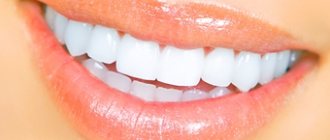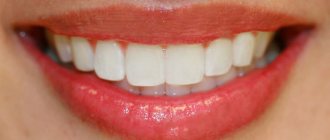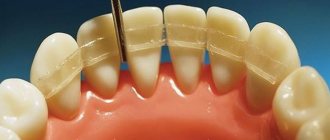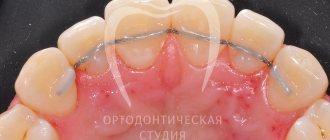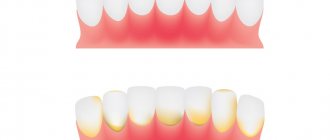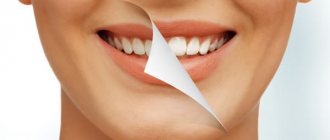Tooth enamel is the outer shell of the crown part of the tooth, which protects the crowns from the aggressive effects of microbes, bacteria, temperature changes and other negative factors. The thicker and stronger the tooth enamel, the more reliable the protection.
Enamel is the hardest substance in the human body, which is explained by a high degree of mineralization: with a water content of 3%, the proportion of inorganics reaches 97%. In different areas where the dental crown is located, the enamel has a certain thickness - on the sides of the teeth the enamel is thicker, on the chewing side it is slightly thinner, and the thinnest coating is located at the gingival edge.
Over time, the thin enamel layer of the tooth wears off (the process is especially accelerated with insufficient oral hygiene), chips and cracks form on the enamel, tooth sensitivity increases, patients react sharply to hot and cold, sweet and sour. At the same time, the enamel is not able to recover on its own, and if you do not react in time, the situation can end catastrophically for the tooth - it will begin to decay. Restoration and restoration of teeth will become necessary.
What does enamel consist of?
Tooth enamel is the hardest tissue of the human body. It is low in water (2-3%) and organic matter (1-2%). The main share (95-97%) falls on minerals - mainly calcium phosphate in the form of hydroxyapatite crystals, as well as magnesium, fluorine, carbon and some other elements.
Beneath the outer covering is a more porous layer of dentin, covering the pulp chamber, which is filled with loose connective tissue containing blood vessels and nerve fibers (pulp).
The thickness of the enamel layer can reach 2 mm in the chewing plane of the tooth and thins to 0.01 mm in the cervical zone.
Self-restoration of tooth enamel
It is impossible to fully restore tooth enamel at home, but minor damage can be eliminated with the help of special pastes and preparations. Doctors recommend using toothpastes with a high content of fluoride and calcium, and reviewing your diet in favor of foods high in these microelements.
At home, you can carry out fluoridation and remineralization using special gels or pastes and mouth guards. At the dental clinic, you can order the production of individual mouth guards and buy high-quality medications.
When is it time to strengthen
It is necessary to carefully monitor the condition of your teeth. If you experience frequent inflammation of the mucous membranes of the oral cavity, think about how to strengthen your gums. Otherwise, there is a risk of developing cervical caries, since the thickness of the enamel at the point of contact between the gum and the crown is minimal.
It’s time to strengthen teeth enamel if one or more signs appear.
- The color has changed. As the outer covering wears away, the yellowish layer of dentin begins to show through.
- The shape has changed. Wear and tear can cause teeth to become flatter, shorter, and rounder, making it more difficult to bite and chew food.
- A white chalky spot has appeared - the initial stage of caries, at which it is easiest to deal with it. The destruction of the layer is just beginning, so its surface remains even and smooth.
- Increased sensitivity (hyperesthesia) has appeared - a painful reaction when brushing with a toothbrush, eating sour, sweet, cold or hot foods.
- The teeth began to crumble.
What causes enamel thinning?
The strength of the enamel membrane is incredibly high. However, under the influence of a number of external factors, the fabrics begin to wear out.
Doctors include the main reasons for thinning enamel:
- Mechanical damage
is the main reason for the erased protective layer. Such damage is most often caused by bad habits, for example, biting nails, biting off threads, opening vials and bottles with teeth. - Unbalanced diet.
If your daily diet is dominated by sweets, citrus fruits, alcoholic and carbonated drinks, this will have a detrimental effect on the health of your enamel. - Neglect of personal hygiene rules.
The enamel can gradually deteriorate if you use too hard brushes or pastes with a significant content of abrasive substances. - Temperature effects.
Cold soda with hot pizza is a real poison for enamel. Sudden temperature changes thin tissues and destroy enamel. The reasons for temperature effects may be different and may be different. - Bad habits.
Smoking and alcohol abuse can destroy enamel.
Genetic predisposition is not the last factor in the thinning of enamel. Naturally, wear of the protective layer is more often observed in older people, because after 40 years, some minerals are inevitably lost, and the surface of the tooth begins to thin out.
Less common causes of thinning enamel include:
- Pathological processes in the body;
- Abnormal closure of the upper and lower rows;
- Diseases of the gastrointestinal tract, in which the pH of the oral cavity is disturbed;
- Frequent use of antibiotics;
- Deficiency or, conversely, excessive amount of fluoride, inadequate absorption of the substance;
Factors such as pregnancy, hormonal imbalances, menopause in women and men, and puberty can also cause changes in enamel.
How to strengthen tooth enamel
At the first sign of decay, visit the dental clinic. The doctor will conduct an examination and determine the reason why your teeth are crumbling. He will advise you on how to treat tooth sensitivity.
In dental practice, there are several methods aimed at strengthening enamel and protecting against demineralization.
The most common is fluoridation. The effectiveness of this procedure has been confirmed by practice. It involves applying a special fluoride-containing composition to the surface of the teeth. Fluoride penetrates deep into the enamel and promotes better absorption of phosphorus and calcium.
As a result of fluoridation:
- the permeability of the top layer decreases;
- the smallest cracks are sealed;
- the structure of the outer shell becomes smooth and uniform;
- a natural healthy shine appears;
- resistance to pathogenic microflora and acidic environment increases;
- caries is eliminated at the stain stage;
- tooth sensitivity decreases.
Cosmetic defects in the outer covering can be hidden by installing veneers and lumineers or polishing teeth.
What can you do on your own to strengthen your enamel?
The best treatment is prevention. It is worth eliminating some bad habits, and the risk of thinning the enamel will significantly decrease: give up packaged juices, soda, sweets, too hard foods, use brushes with soft bristles, add foods with phosphorus and calcium to your diet. Particular attention should be paid to the choice of toothpaste and additional products (rinses, mouth balms, gels) - if you find it difficult to choose, you can trust the recommendations of professional dentists. Mineral and vitamin preparations, which should be included in your diet on a regular basis, will also not be superfluous.
In some cases, you can use folk remedies, strictly after consultation with your dentist. The most famous folk method is rinsing your mouth with a saline solution before going to bed (1 tablespoon of salt per glass of water). Propolis can also boast excellent remineralizing properties - you can use it in combination with other components or as an independent remedy (applying it to problem areas for 3-5 minutes).
Traditional methods provide only a temporary or minor effect, and you have to spend a lot of time to achieve the desired result.
Prevention of tooth enamel destruction
Simple recommendations will help slow down the destruction of the enamel layer and keep teeth healthy.
- Visit your dentist at least once a year. Even in the absence of discomfort in the oral cavity, the doctor will see the initial stages of the disease and begin timely treatment.
- Brush your teeth at least twice a day, morning and evening, and use dental floss to remove food debris from your mouth.
- After eating, rinse your mouth with clean water and take your medication with plenty of water.
- Eat foods containing sugar less often. Each consumption of sugar leads to the growth of bacteria in the mouth.
- Limit your consumption of sugary sodas and juices - some of the acids in them are more corrosive than battery acid.
Do not forget that oral care should be carried out regularly and comprehensively throughout your life. Following one rule will only slightly reduce the risk of developing pathology. Oral care should become a habit and become a lifestyle.
When should you see a doctor?
- increased sensitivity of teeth,
- pain when brushing teeth, eating solid foods,
- acute discomfort due to exposure to any irritants - hot, cold or spicy food,
- uneven enamel surface - the presence of chips, cracks, roughness and even depressions,
- discoloration of enamel - when it becomes thinner, dark dentin shows through,
- congenital or acquired enamel hypoplasia.
Strengthening teeth: 5 reliable methods
Expert opinion
Elina Ruslanovna Dzagurova Dentist-therapist Work experience 10+
“Our center practices an integrated approach, because it is the combination of several techniques that can significantly reduce tooth sensitivity and strengthen tooth enamel. The patient himself needs to do a lot of work – be sure to monitor his diet and use the right hygiene products.”
Enamel remineralization
Remineralization of teeth is the restoration of the mineral composition of tooth enamel, for which special medicinal compositions are used. They are applied to the teeth (including using mouth guards) and held for several minutes. A number of drugs are activated by exposure to ultraviolet light or electrophoresis (electrical pulses). The course of such treatment and prophylactic procedures can last from 3-4 to 20 days. Before they are performed, careful removal of plaque and tartar is required.
For remineralization, Apadent Pro paste with nano-hydroxyapatite is considered one of the most effective preparations, which allows you to restore the structure of teeth in the presence of foci of demineralization, including superficial caries.
Fluoridation of enamel
Fluoridation differs from remineralization only in the composition of medicinal preparations. In this case, gels and ointments are also used, which are applied to the outer surface of the teeth. However, most of their composition is occupied by fluorine and calcium, which significantly strengthen the enamel, making it stronger and more resistant to external influences.
Proper hygiene
The patient himself needs to more carefully monitor his oral hygiene and be sure to change his dental care products. The general rules are that the brush should not be too hard (during the period of exacerbation, you can change it to a soft one, but not for long - it will not cope with plaque). When brushing your teeth, do not put too much pressure on your teeth - this leads to trauma to the enamel.
During the period of weakening of the enamel, you should choose special pastes that reduce tooth sensitivity. However, you do not need to use them constantly - 1-2 times a year for a month.
Proper nutrition
The process of remineralization of enamel can be carried out at home - all you need to do is change your diet. Milk and fermented milk products (cheese, yogurt, kefir), greens, strawberries (contain a large amount of vitamin C), green tea will be useful. You should consume as many foods as possible that contain calcium1 - it helps strengthen tooth enamel.
You can take calcium in the form of medications 1-2 times a year. However, do not forget about the simultaneous intake of vitamin D, which promotes the absorption of calcium and fluoride in our body.
Dental restoration
Dental restoration is an extreme measure that is used in case of hypoplasia or destruction of tooth enamel, because the internal tissues of the tooth may be exposed. In this case, it is extremely necessary to protect them from external irritants. The most reliable option would be to install veneers and lumineers - thin overlays on the front surface of the teeth, which allow you to change the shade, align the position of the teeth, transform their appearance and, of course, protect the enamel from negative external influences.
Professional treatment
To make an accurate diagnosis and determine the cause of enamel destruction, the doctor conducts a full examination of the oral cavity. If the reasons are a lack of beneficial vitamins and minerals, it is necessary to adjust the diet. If the reason is working with chemicals, it is necessary to review protective equipment at work. Locally, both for caries and for erosion or necrosis, remineralization of teeth or fluoridation is necessary. Both procedures are carried out after professional oral hygiene (removal of plaque and stones). If the spots are pigmented and located in the smile area, either grinding or tooth restoration is necessary.
When the enamel is badly damaged, pastes and minerals cannot save the matter. In such a situation, doctors advise installing veneers or hiding defects with filling material. Your doctor will determine which method of restoring tooth enamel is right for you. But don’t forget, the health of your teeth primarily depends on you!
Clinical researches
Conducted clinical studies conducted at the First St. Petersburg State Medical University. acad. I.P. Pavlova proved that regular use of professional toothpaste ASEPTA REMINERALIZATION after 4 weeks improved the condition of the enamel by 64% and reduced tooth sensitivity by 66%.
Sources:
- Clinical and laboratory assessment of the influence of domestic therapeutic and prophylactic toothpaste based on plant extracts on the condition of the oral cavity in patients with simple marginal gingivitis. Doctor of Medical Sciences, Professor Elovikova T.M.1, Candidate of Chemical Sciences, Associate Professor Ermishina E.Yu. 2, Doctor of Technical Sciences Associate Professor Belokonova N.A. 2 Department of Therapeutic Dentistry USMU1, Department of General Chemistry USMU2
- Report on the determination/confirmation of the preventive properties of personal oral hygiene products “ASEPTA PLUS” Remineralization doctor-researcher A.A. Leontyev, head Department of Preventive Dentistry, Doctor of Medical Sciences, Professor S.B. Ulitovsky First St. Petersburg State Medical University named after. acad. I.P. Pavlova, Department of Preventive Dentistry
- Clinical studies of antisensitive toothpaste “Asepta Sensitive” (A.A. Leontyev, O.V. Kalinina, S.B. Ulitovsky) A.A. LEONTIEV, dentist O.V. KALININA, dentist S.B. ULITOVSKY, Doctor of Medical Sciences, Prof. Department of Therapeutic Dentistry, St. Petersburg State Medical University named after. acad. I.P. Pavlova
- The role of anti-inflammatory rinse in the treatment of periodontal diseases (L.Yu. Orekhova, A.A. Leontyev, S.B. Ulitovsky) L.Yu. OREKHOVA, Doctor of Medical Sciences, Prof., Head of Department; A.A. LEONTIEV, dentist; S.B. ULITOVSKY, Doctor of Medical Sciences, Prof. Department of Therapeutic Dentistry of St. Petersburg State Medical University named after. acad. I. P. Pavlova
- Report on determining/confirming the preventive properties of commercially produced personal oral hygiene products: Asepta toothpaste used in combination with Asepta mouthwash and Asepta gum balm Head. Department of PFS Doctor of Medical Sciences Professor S.B. Ulitovsky St. Petersburg State Medical University named after Academician I.P. Pavlova. Faculty of Dentistry. Department of Preventive Dentistry.
Is it possible to restore enamel with diet?
In everyday life, it is important to follow an anti-caries diet. It involves limiting the consumption of sweets and, in particular, sugary drinks. The menu should consist of hard, grainy and even fibrous foods.
A diet to maintain enamel also involves increasing the daily proportion of calcium in the menu. If there are no other health contraindications, it is recommended to increase the consumption of milk and dairy products, such as white cheese and natural yogurt. Unfortunately, once lost, enamel cannot be restored.
Reviewing your diet to maintain dental health
Products harmful to teeth
- Coffee and tea, without which not a single morning or working day can be completed. The caffeine contained
in these products makes tooth enamel loose, and it loses its protective properties. - Sugar and sweet foods, which are especially abused by children. After each meal completed with a sweet table, be sure to rinse your mouth so that food particles melt and do not remain between your teeth.
- Dairy products - the plaque formed after their consumption can destroy tooth enamel, despite the calcium content, which is beneficial for dental tissue. Rinsing will also help here, especially if you drank or ate something dairy before bed.
In addition, too hot or very cold foods are extremely harmful, especially if consumed one after another. Temperature changes negatively affect tooth enamel and contribute to its destruction, especially when there are microcracks in it.
Please note: all of the above rules are relevant not only for adults, but also for children. As soon as the child starts eating solid foods, he should be taught good oral hygiene and reminded to rinse his mouth after every meal. And try not to spoil your baby with sweets - even strong teeth will not withstand the aggressive effects of sugar and will quickly begin to decay.
Foods good for dental health
Among the obvious leaders are cottage cheese, cheese, spinach and beans, the substances they contain can have the most positive effect on the condition of the enamel and dental tissue. Fish and seafood are also very useful, known for their positive effects on various organs and tissues of the human body. To clean your teeth, it is recommended to eat nuts, hard fresh vegetables and fruits. They will bring many times more benefits than popular confectionery products.
For babies who are teething, doctors recommend preparing calcined cottage cheese. It is not difficult to obtain - when preparing a product from milk, simply add chlorinated calcium to the mixture, having first checked the recipe with your pediatrician. It will not affect the taste of the finished dish, but the calcium content in the cottage cheese will increase significantly, and the child’s teeth will grow faster and will pleasantly surprise children’s doctors with their impeccable health.
Dental health as an indicator of body condition
Is the condition of teeth related to human health? Numerous studies have proven a direct relationship between these aspects. Thus, several hundred years ago, during the dark periods of medieval slavery and serfdom, the health of hired workers and purchased servants was checked precisely by the condition of their teeth, and this diagnostic method was no less effective than modern ultrasound and tomography. So, if you have low immunity, diseases of the digestive system, metabolic disorders, all this will immediately affect the condition and appearance of the dentition. Therefore, the first signs of any dental illness are a surefire reason to put things off and undergo a comprehensive examination of the body in order to not only eliminate the consequence, but also to identify the cause of persistent dental problems.
How to keep your teeth healthy and strong? Traditional medicine tips
People's experience has accumulated a lot of valuable advice on maintaining dental health. These recommendations are still relevant today, despite the abundance of official medicine.
- Use a mixture of honey and salt (1 tablespoon and 0.5 teaspoon, respectively) as a massage mixture to treat gums. Very soon they will stop bleeding, and the teeth will not wobble in their sockets.
- Lemon, horsetail and black radish will help you cope with tartar. The substances contained in these products destroy and soften tartar, facilitating its removal.
- Black stripes along the edges of the teeth are a dubious decoration that can be easily gotten rid of. Bean husks and burdock root will help you. A strong decoction based on these substances must be used as a rinse several times a day, and the result will not be long in coming.
- A mixture of calamus and propolis tinctures will do an excellent job of strengthening enamel. Long-term rinsing of the mouth with this mixture will help quickly restore teeth and gums.
- Oak bark will help in the fight against inflammation and ulcers on the mucous membrane. Rinsing before bed will relieve redness, fight infection and remove odor, even if you smoke excessively.
However, remember that traditional medicine is not suitable for everyone, and their effectiveness has not been proven by experts. Do not neglect the problem in search of optimal treatment; use professional products from the ASEPTA line.
Main causes and degrees of mobility
Before considering how to save a loose tooth, it is important to identify the main factor that caused it. Possible reasons include:
- mechanical damage (trauma). As a result of various bruises, damage to the periodontal tissues and root displacement occur. It is worth noting that if the tooth remains in the socket, it is enough to carry out strengthening procedures to save it;
- genetic predisposition. For patients with poor heredity at any age, it is important to take preventive measures to strengthen teeth in order to avoid problems in the future;
- periodontal diseases (for example, gingivitis, periodontal disease). They make the roots weak, causing bleeding and swelling. In the absence of timely treatment, the gums will become loose, which will lead to mobility and loss of teeth;
- bruxism (“teeth grinding”). Very often, bruxism bothers you at night. In such situations, it is recommended to wear special protective equipment during sleep;
- abuse of alcohol and tobacco products. They weaken the body’s protective properties and have a destructive effect on bone tissue, which can lead to instability;
- poor nutrition. People who abuse junk food, neglecting foods with healthy vitamins, minerals and trace elements, often complain of dental problems. In such situations, it is important to start eating a balanced diet and drinking a vitamin complex;
- systemic diseases (osteoporosis, thyroid dysfunction and other abnormalities of the endocrine system). They have a negative impact on the condition of the entire body;
- age. Over the years, due to deterioration of blood supply, bone tissue atrophy gradually occurs, which leads to loose teeth;
- low immunity (for example, due to recent chemotherapy). Since the body lacks the strength to resist, the most vulnerable parts suffer first, the oral cavity being one of them;
- pregnancy and lactation period. The body experiences an acute shortage of microelements and vitamins, and hormonal surges occur. This all affects the condition of the oral cavity;
- uncontrolled use of certain medications.
In this case, four degrees of mobility are distinguished. In the first, the teeth deviate slightly to the side (less than 1 mm). On the second, the amplitude increases (by more than 1 mm). On the third, they deviate in all directions. On the fourth, they are able to rotate around their axis. The answer to the main question: “if a molar tooth is very loose, can it be saved?” positive. But this requires long-term complex treatment.


